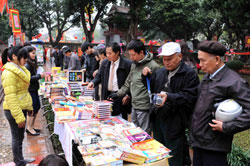VietNamNet Bridge – Vietnamese poets and their counterparts from 26 countries and territories throughout the world took part in an exciting array of activities arranged to celebrate Viet Nam Poetry Day 2012 yesterday, Feb 5.
Not a verse: Poetry books are sold at the gathering. (Photo: VNS)

"We can't build true and healthy poetry if we don't consolidate world peace," said Nguyen Huu Thinh, chairman of the Viet Nam Writers Association (VWA).
National Poetry Day performances and related activities were held at Van Mieu (Temple of Literature), Ha Noi, and organised in both Vietnamese and English for the first time. Poetry lovers shared the day with foreign tourists who stopped by the events to enjoy poems from different cultures.
|
HCM City celebrates National Poetry Day A gathering of literary stalwarts at the Ho Chi Minh Museum yesterday morning kicked off the annual National Poetry Day celebrations held in HCM City. The event, held on the 15th day of the first lunar month and organised by the city Writers' Association and Sai Gon Giai Phong (Liberated Sai Gon) newspaper, has as its theme this year "HCM City- The City of Ten Flower Seasons", marking 10 years since the event was first held. A poem titled Nguyen Tieu (Traditional festival on the fifteen day of the first lunar month) by President Ho Chi Minh, one of the country's most popular poets, was recited on stage to mark opening. Organisers said this year's festival would focus on 15 young poets, including newcomers like Tuong Vi, Doan Phuong Huyen and Huynh Man Chi, who read their works for the first time in public. The festival also highlighted works by members of 13 poetry clubs and two websties from local universities and cultural centres. The amateur poets read their works after discussing their problems. As usual, a series of traditional arts performances were presented by local troupes. |
Hundreds of poets gathered at a gala night entitled Dat Nuoc Mua Xuan (Spring in the Motherland) on Saturday and passed many candles from hand to hand to express their dream of peace and strong poetry.
The gala was very meaningful for participants who had a good chance to share their feelings through poems and songs. Vietnamese and foreign poets stood on the same stage to read their works.
Organised like an art performance, the gala combined poetry with traditional Vietnamese music such as then (local folk songs) singing from the northern province of Cao Bang, ca tru (ceremonial singing) and chau van (spiritual singing).
Foreign poets had an opportunity to exchange ideas with local colleagues, present their works and gain a better understanding of Vietnamese culture.
"With the honour of hosting the first Asia-Pacific Poetry Festival, we purposefully organised the event near National Poetry Day with the aim of luring foreign poets to Vietnamese poetry," Thinh said.
Poet Nguyen Quang Thieu, vice chairman of the VWA, said he had attended poetry festivals in many countries and was surprised that foreign poets joined their festivals.
"I realised that both the beautiful poems and the uniqueness of different cultures made the festivals attractive," Thieu said.
He added that the VWA was aiming to upgrade the National Poetry Day into an international festival.
Poet Nicolai Pereyaslov from Russia said it was a precious opportunity for all poets to exchange ideas and understand each other.
"Exchanges between poets can wipe away barriers," he said. "Poetry has an eternal mission to bring people closer to each other and to be a bridge between communities."
He also said that Thieu's Bai Hat Ve Co Huong (A Song of the Homeland) was voted by Russian readers as the best poem translated into Russian in 2011.
While Vietnamese and foreign poets gathered on the International Poetry Stage, the Traditional Poetry Stage this year honoured poets of the Tho Moi (New Poetry) movement which was launched in the early 20th century by young intellectuals influenced by the Western literature that was introduced to Viet Nam by the French. The poets created and used language and figures of speech in their own way to express their egos in an escape from the feudalist past.
Popular poets of the movement were introduced such as Te Hanh, Xuan Dieu, The Lu and Luu Trong Lu through their biographies, portraits and works.
Along the paths that meander through Van Mieu, representatives from 10 cities and provinces built poetry huts to present their finest contemporary poetry to the visitors.
VietNamNet/Viet Nam News